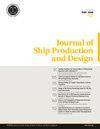Microstructure and Mechanical Properties of GTAW Welded Joint of Invar Alloy
IF 0.5
4区 工程技术
Q4 ENGINEERING, MARINE
引用次数: 0
Abstract
Experiment of automatic gas tungsten arc welding of liquefied natural gas carrier Invar alloy with a thickness of .7 mm was completed, and the welding parameters were optimized, as well as microstructure and mechanical properties of the welded joint were measured and analyzed. The grain size of the area near the weld centerline was small, mainly cellular dendrites, and the grain size on both sides of the weld centerline increased gradually, mainly dendrites, whereas the grain size near fusion line was larger, and there were more columnar crystals. The heat-affected zone was composed of coarse austenite grains. Transgranular cracks were the main cracks in the welding seam. When welding current was 40 A, frequency was 120 Hz, and welding speed was 350 mm/min, tensile strength of the welded joint was 446.9 MPa, which 88.1% of the base metal’s tensile strength and 10.3% of the fracture elongation. The fracture surface of tensile specimens showed typical plastic fracture characteristics, with no obvious crack characteristics, and no eutectic liquid films were observed. Invar alloy is a Fe–36%Ni alloy. Its thermal expansion coefficient at room temperature is less than 1.6X10-6/k, which is about one-tenth of that of low carbon steel, and changes little in a larger temperature range. Therefore, Invar alloy is widely used in making precision measuring instruments and low temperature-resistant materials (Corbacho et al. 1998; Park et al. 2011; Qiu et al. 2016; Yakout et al. 2018). In recent years, with the increasing demand for clean energy, liquefied natural gas (LNG) carriers are developing rapidly (Zhao et al. 2015; Oh et al. 2018). LNG liquefies at temperatures below -161.5°C. The volume of LNG is about 1/ 625 of the volume of gaseous natural gas of the same mass; thus, it can transport large quantities of natural gas over long distances.因瓦合金GTAW焊接接头的组织与力学性能
对厚度为.7mm的液化天然气载体因瓦合金进行了钨极气体保护焊试验,优化了焊接参数,并对焊接接头的组织和力学性能进行了测量和分析。焊缝中心线附近区域的晶粒尺寸较小,主要为胞状枝晶,焊缝中心线两侧的晶粒尺寸逐渐增加,主要为枝晶,而熔合线附近的晶粒尺寸较大,柱状晶体较多。热影响区由粗大的奥氏体晶粒组成。焊缝中的主要裂纹为穿晶裂纹。当焊接电流为40A,频率为120Hz,焊接速度为350mm/min时,焊接接头的抗拉强度为446.9MPa,为母材抗拉强度的88.1%,断裂伸长率的10.3%。拉伸试样的断口表现出典型的塑性断裂特征,没有明显的裂纹特征,也没有观察到共晶液膜。因瓦合金是一种Fe–36%的Ni合金。其室温下的热膨胀系数小于1.6X10-6/k,约为低碳钢的十分之一,在较大的温度范围内变化不大。因此,因瓦合金被广泛用于制造精密测量仪器和耐低温材料(Corbacho等人,1998;Park等人2011;邱等人2016;Yakout等人2018)。近年来,随着清洁能源需求的不断增加,液化天然气(LNG)运输船正在迅速发展(赵等人,2015;Oh等人,2018)。液化天然气在低于-161.5°C的温度下液化。液化天然气的体积约为相同质量的气态天然气体积的1/625;因此,它可以远距离输送大量的天然气。
本文章由计算机程序翻译,如有差异,请以英文原文为准。
求助全文
约1分钟内获得全文
求助全文
来源期刊

Journal of Ship Production and Design
ENGINEERING, MARINE-
CiteScore
1.10
自引率
0.00%
发文量
19
期刊介绍:
Original and timely technical papers addressing problems of shipyard techniques and production of merchant and naval ships appear in this quarterly publication. Since its inception, the Journal of Ship Production and Design (formerly the Journal of Ship Production) has been a forum for peer-reviewed, professionally edited papers from academic and industry sources. As such it has influenced the worldwide development of ship production engineering as a fully qualified professional discipline. The expanded scope seeks papers in additional areas, specifically ship design, including design for production, plus other marine technology topics, such as ship operations, shipping economics, and safety. Each issue contains a well-rounded selection of technical papers relevant to marine professionals.
 求助内容:
求助内容: 应助结果提醒方式:
应助结果提醒方式:


